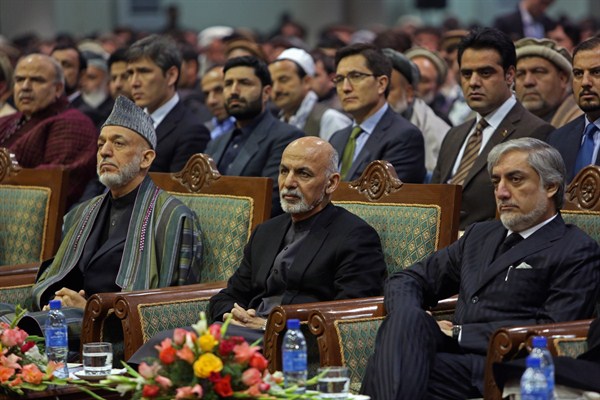Afghan officials were expected to enter into a second round of Pakistani-brokered talks with Taliban representatives this week, a highly contentious initiative upon which President Ashraf Ghani has staked his presidency. But that peace process became more uncertain with the announcement Wednesday by the Afghan government of the death of Mullah Omar, the militant movement’s reclusive leader, which prompted a Taliban spokesman to disavow talks and Pakistan to declare their postponement. Dealing with the Taliban insurgency, however, is far from the only domestic challenge facing the Ghani administration. Unresolved domestic rivalries and newly institutionalized tensions created by last year’s power-sharing agreement have limited Ghani’s authority and ability to deliver on promised reforms.
Ghani is only the second president to lead Afghanistan since the ouster of the Taliban regime nearly a decade and a half ago. His predecessor, President Hamid Karzai, came to office with a narrow domestic political base and limited control over the activities of the U.S.-led international military coalition, which often bypassed the central government to partner with local strongmen seen as effective sources of security and intelligence against the Taliban. Many of those strongmen entered the formal government system after the fall of the Taliban, taking up positions within the security services or at the provincial level, siphoning off customs revenues and the benefits of the internationally fueled war and aid economy.
Despite the limits of his authority, Karzai became adept at manipulating Afghan politics over the course of his 12 years in office. He took advantage of the highly concentrated formal powers of the presidency and the privileges conveyed by international recognition of his office to co-opt or marginalize rivals, even as his relationship with many international actors eventually soured in the final years of his term. Although the Afghan government remains highly dependent on international donors to fund and supplement its basic operations, and many communities continue to exercise a high degree of local autonomy, Karzai was largely successful in preserving his influence as a broker within this system. He was not necessarily successful, however, in implementing policies that might fundamentally alter Afghans’ relationship with the state, end the Taliban insurgency or set the country on a path to sustainable growth.

